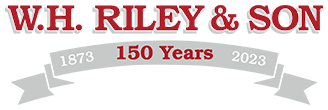My Furnace Is Rusty! 3 Problems And How To Solve Them.

A properly installed and maintained heating furnace should last more than a decade – but nothing lasts forever, and eventually your equipment will start to show signs that it will need to be replaced.
One of those signs is rust, which can be a serious problem in a furnace – especially if the rust occurs in the ventilation or heat exchanger areas, where dangerous combustion gases (carbon monoxide, sulfur dioxide, and nitrous dioxide) could leak.
So what causes rust on a furnace, and how do you slow or prevent it from forming? Here are three of the most common causes of furnace rust and what you can do to keep rust from shortening the life of your heating system.
1. Water leaks or humidity – Water from leaky pipes or rainwater can cause moisture buildup near your furnace, and an over-humid home can force moisture to accumulate in the return ducts of your heating system.
Solutions:
- Invest in waterproofing measures such as better drains, downspouts, caulking and weather stripping.
- Address any plumbing issues promptly (call a professional plumber in southeastern MA – don’t do it yourself!).
- Consider managing humidity with a whole-house humidifier/dehumidifier
2. Air conditioner leaks – In some HVAC systems, your furnace and air conditioning units are installed very close to one another – in some cases, directly on top of the other. If your A/C leaks, that moisture can get in the furnace. A cracked drain pan or clogged condensate line can also leak into your furnace, eventually causing rust.
Solution:
- Get professional air conditioning maintenance every year.
- Check your drain pan to see if it is damaged or overflowing. If it is, call a professional to have the faulty part replaced.
3. Exhaust problems – As hot gases and vapors move away from the heat of the burner and toward the flue through the heat exchanger, they may cool and form water vapor, which can pool and corrode the heat exchanger and flue.
Solution:
- Contact a heating system maintenance professional – An expert heating technician may be able to improve the ventilation of your heating system and solve the problem – or he could suggest that you replace your system rather than pouring money into costly heating repairs on old equipment.
- Get professional preventive maintenance for your heating equipment every year – a heating system expert can spot early signs of a problem before they cause this kind of damage.
If you notice signs of corrosion on your older-model furnace, it’s time to think about replacing it – Contact W.H. Riley & Son for FREE, no obligation estimate on furnace installation in southeastern Massachusetts or northern Rhode Island.

